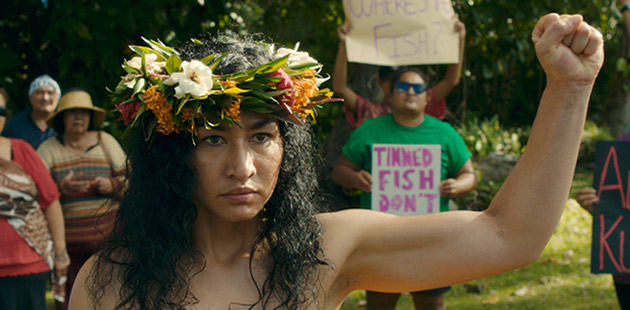 “Envisioning a world where a diversity of women’s voices, stories and creativity are equally recognised and celebrated” reads the mission statement of the Melbourne Women in Film Festival.
“Envisioning a world where a diversity of women’s voices, stories and creativity are equally recognised and celebrated” reads the mission statement of the Melbourne Women in Film Festival.
Now in its fourth year, the 2020 MWFF seeks to spotlight ‘stories in colour’, with its opening night launch of Pacific Island anthology film Vai providing a powerful testimony to the importance of diverse storytelling.
Marina Alofagia McCartney, one of the extraordinary writer-directors responsible for Vai, opened MWFF 2020 by speaking about the importance of representation for Pacific filmmakers. The scant presence of Pacific filmmaking, particularly from women, effectively silencing the voices of marginalised communities from speaking-out regarding issues of identity, economic struggle and racism.
The filmmakers responsible for Vai – including McCartney, Becs Arahanga, Amberley Jo Aumua, Matasila Freshwater, Dianna Fuemana, Miria George, Ofa Guttenbeil, Nicole and Sharon Whippy – had set-up some strict boundaries for the movie they were going to create.
Each of the eight vignettes, presented mostly as one-take shots, must be told from the perspective of a Pacific woman (Vai) with an ancestral connection to her respective island (the likes including Fiji, Tonga, Solomon Islands, New Zealand, Cook Islands and Niue). The output of this wide coverage delivering an impeccably cohesive series of short films that bring to the forefront the contemporary issues faced by women of the Pacific.
The breadth of the Vai’s hardships are of heart and mind. We watch as each iteration of Vai, from four-years-old to eighty-years-of-age, navigates the moving ground beneath her. Regardless of Vai‘s age and locale, the financial inequity that results in diaspora appears frequently throughout the film. The recurring nature of this issue highlights the resilient nature of indigenous people in preventing western influence, particularly capitalism, from corroding their traditions, land and culture.
Each film doesn’t so much as build to a climax as it does offer emancipation to each version of Vai, with the harbinger of her freedom coming from her connection to a homeland. The importance of recognising this connection to the land is one seldom depicted in Pakeha filmmaking, with the Pacific women at the helm of Vai demonstrating the importance of diverse storytellers at the helm of their own narrative.
There is an awe-inspiring nature to the visuals that captures not only the beauty of each location, but the spirited demeanour of each depiction of Vai. The decision to film as (predominantly) one-shot takes enables the viewer to watch Vai’s journey as a progression of facial expressions. The absence of editing further helping to establish the complex relationships – told in a loving stare or teary reunion – had with Vai and the women in her family.
What the filmmakers behind Vai have achieved is nothing short of astounding. Their commitment towards close-to-home storytelling, defying conventions of western storytelling with fervent aplomb, radiates with a glowing passion across every frame.
Vai screened as part of the Melbourne Women in Film Festival.
Image: Vai – courtesy of NZ on Screen
Review: Hagan Osborne
